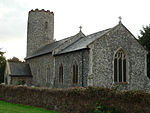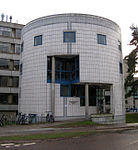Bowthorpe is a suburban village to the west of Norwich, in the county of Norfolk, England. It is primarily a residential area, but includes a large industrial estate (Bowthorpe Industrial Estate; occupied by mix-use commercial business, including the technology sector) and one small out-of-town shopping centre, containing a supermarket and various smaller retail outlets. A community hall is situated close to Bowthorpe village centre. A police station was located near the centre until it closed in 2018. Most of present-day Bowthorpe has been developed from the 1970s onward.
The villages name means either 'Bui's outlying farm/settlement' or 'bow farm/settlement'.
Bowthorpe is divided into four distinct areas:
Clover Hill
Chapel Break
Three Score
Bowthorpe Industrial EstateThe largest of these areas is Clover Hill, a mix of council development and private housing, making up almost two-thirds of Bowthorpe. Clover Hill, situated to the east of the other three areas was developed in the 1970s and 1980s. Further development of the mainly private housing estates, Chapel Break and Three Score took place in the 1990s and early 2000s.
In 1549, Robert Kett briefly camped at Bowthorpe at the beginning of the rebellion that was to bear his name. On 10 July 1549, the Sheriff of Norfolk: Sir Edward Wyndham, was nearly pulled from his house by the rebels in the village as he tried to persuade them to disband. This helped to inspire further people from Norwich to join Kett at his camp in the village. Kett quickly decided that Bowthorpe was too exposed for a rebel camp, and moved on to Mousehold Heath.Bowthorpe differs from the nearby estates of Earlham and Costessey; by having a high variability of housing stock, and a centrally planned network of bus and bicycle-only lanes. Large open spaces and parks border the periphery of the Bowthorpe housing estate, with Bowthorpe Park between the north of the estate and Dereham Road, and the Yare Marshland and Bowthorpe Southern Park bordering the south and west of the estate.








